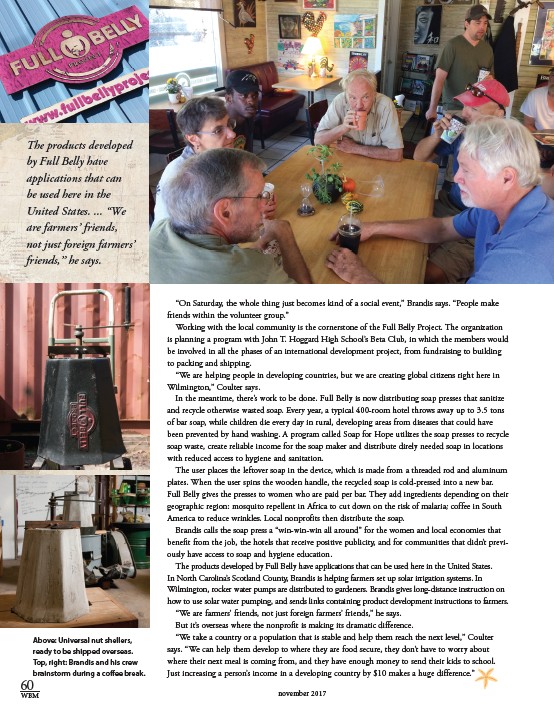
The products developed
by Full Belly have
applications that can
be used here in the
United States. ... “We
are farmers’ friends,
not just foreign farmers’
friends,” he says.
Above: Universal nut shellers,
ready to be shipped overseas.
Top, right: Brandis and his crew
brainstorm during a coffee break.
“On Saturday, the whole thing just becomes kind of a social event,” Brandis says. “People make
friends within the volunteer group.”
Working with the local community is the cornerstone of the Full Belly Project. The organization
is planning a program with John T. Hoggard High School’s Beta Club, in which the members would
be involved in all the phases of an international development project, from fundraising to building
to packing and shipping.
“We are helping people in developing countries, but we are creating global citizens right here in
Wilmington,” Coulter says.
In the meantime, there’s work to be done. Full Belly is now distributing soap presses that sanitize
and recycle otherwise wasted soap. Every year, a typical 400-room hotel throws away up to 3.5 tons
of bar soap, while children die every day in rural, developing areas from diseases that could have
been prevented by hand washing. A program called Soap for Hope utilizes the soap presses to recycle
soap waste, create reliable income for the soap maker and distribute direly needed soap in locations
with reduced access to hygiene and sanitation.
The user places the leftover soap in the device, which is made from a threaded rod and aluminum
plates. When the user spins the wooden handle, the recycled soap is cold-pressed into a new bar.
Full Belly gives the presses to women who are paid per bar. They add ingredients depending on their
geographic region: mosquito repellent in Africa to cut down on the risk of malaria; coffee in South
America to reduce wrinkles. Local nonprofits then distribute the soap.
Brandis calls the soap press a “win-win-win all around” for the women and local economies that
benefit from the job, the hotels that receive positive publicity, and for communities that didn’t previ-ously
have access to soap and hygiene education.
The products developed by Full Belly have applications that can be used here in the United States.
In North Carolina’s Scotland County, Brandis is helping farmers set up solar irrigation systems. In
Wilmington, rocker water pumps are distributed to gardeners. Brandis gives long-distance instruction on
how to use solar water pumping, and sends links containing product development instructions to farmers.
“We are farmers’ friends, not just foreign farmers’ friends,” he says.
But it’s overseas where the nonprofit is making its dramatic difference.
“We take a country or a population that is stable and help them reach the next level,” Coulter
says. “We can help them develop to where they are food secure, they don’t have to worry about
where their next meal is coming from, and they have enough money to send their kids to school.
Just increasing a person’s income in a developing country by $10 makes a huge difference.”
60
WBM november 2017